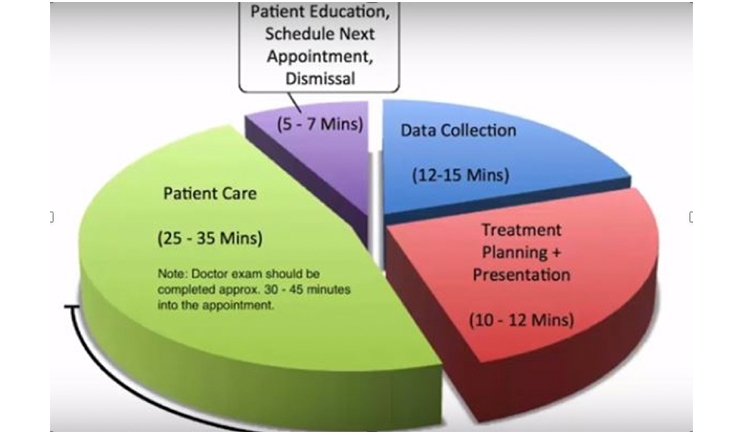
You know that you have mastered your scheduling system when your daily schedule has met your monthly production goal. But wait!
If you have met the production goal for the practice, do you feel like you’re running on a treadmill?
Have you figured out how to schedule your day so you’re working smarter, not harder?
Do you have numerous patients who show up late for appointments?
If you answered yes to any of these questions, how do you handle these challenges so your entire day isn’t thrown off? How do you organize the schedule and your tardy patients so there isn’t a domino effect that causes high stress levels that create an inflammatory response for the dental team?!
Successful Scheduling: Creating the Plan
First, know your annual goal. Then break it down into monthly and daily goals. Next, schedule to meet these goals. Pre-block for:
- New patients for the doctor’s schedule
- New patients for the hygiene schedule
- Sedation patients
- High-end treatment
- Perio therapy
- Emergency patients
- Team meetings, scheduled weekly or monthly
Tips for The Tardy Patient
Every dental practice has a group of patients who consistently arrive late. Who are your patients who are chronically tardy? When these people arrive late, they will need to understand that they may need to return to continue their care when you can’t complete it all. Also, schedule them before lunch and at the end of day, but let them know they may need to return if you need more time to complete their scheduled service.
Value-Add Scheduling
So, who is the best person to schedule the next hygiene appointment? Hygienists are the most valuable personnel to schedule all routine preventive care appointments. The best time for a hygienist to schedule the next appointment is at the end of the patient appointment.
But why should hygienists schedule their patient appointments? It’s because hygienists can feel overworked, like they are running on a treadmill, and it seems like a never-ending cycle to stay on time. Fortunately, there is a formula for time management with routine preventive care patients (see the Figure). There also are a few important things you need to do to keep a successful schedule:
- Explain the value of the appointment you are going to schedule. What do you know is valuable to your patient? Talk about your patients’ value when they complete the service.
- Take charge of your schedule. Offer patients a day and time similar to the one they are there for. Also, never ask them when they would like to return. Not many patients are eager to return for a dental appointment. Plus, it’s your schedule, so you take charge of when appointments will be scheduled.
- Pre-schedule blocks of specific appointments (see the Figure, again). Use 10-minute increments, as 15-minute appointments will cost you thousands of dollars more in production.
- Be sure each patient understands your “change of appointment” policy. Adhere to it. Rules are not made to be broken, as broken appointments cost your office thousands of dollars each year.
The result of a successful scheduling system brings value to your patient, harmony to the office, increased production, and reduced stress for both your patients and the entire team. It is a win-win for everyone.
Ms. Seidel-Bittke is a registered dental hygienist and the CEO of Dental Practice Solutions, which she founded in 2000. Since that time, she has continued to support the optimization of hygiene departments globally. Through her proven systems to communicate with dental patients about oral disease, she creates highly profitable dental practices around the world. You can reach her at admin@dentalpracticesolutions.com or (888) 816-1511. Also, check out her no-cost hygiene department training at dentalhygiene.solutions.
Disclosure: Ms. Seidel-Bittke does not have any conflicts of interest.
Related Articles
The New Gingivitis Code: What Do We Do Now?
Prophy or Perio Patient – What’s Your Why?


